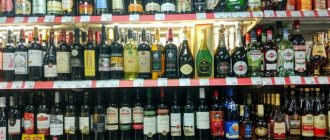Content:
- What drinks are called alcoholic?
- Why does the law regulate the sale of alcohol to minors?
- What is written in the regulatory framework
- “Hot drinks” that people under 18 cannot buy
- Advantages and disadvantages of Russian legislation
- Purpose of existing restrictions
- Other restrictions regarding the sale of alcohol
- How to respond to prohibitions
Any alcohol in the Russian Federation is allowed to be purchased only from 18 years of age. It is possible that legislation will increase this age limit in the near future. Then the age at which you can buy alcohol will be even more respectable - from 21 years old.
Buying alcohol on holidays
According to some numbers, alcohol cannot be sold according to Russian law. Not only vodka and other strong drinks, but in principle, including beer. In any quantity. These are all holidays associated with children and youth.
The sale of alcohol on September 1 is prohibited throughout the Russian Federation
There are also restrictions on the sale of alcohol on some other holidays. Of course, in fact, alcohol may be sold somewhere. But this is a violation of the law, which will sooner or later be discovered, condemned, and the administrative sentence will be carried out.
If someone wants to buy alcohol on any day, well, he can simply, knowing the dates and the law of Russia, stock up in advance. For example, before Knowledge Day in September, Children's Day, Youth Day.
So if you want to buy alcohol, you should look at how many days are left before the holiday. But the date of the last call may change in one year or another. So buying alcohol one day may not work out. But if a person always has a reserve, then this is not a problem for him.
Why does the law regulate the sale of alcohol to minors?
Legislative acts that indicate at what age you can buy alcohol - strong and weak - were drawn up for a reason. In the 21st century, childhood drunkenness has become a pressing problem. Every year, more and more schoolchildren come to see narcologists, who cannot imagine their lives without “hot drugs.” These children need urgent medical attention.
If they do not undergo treatment for alcohol addiction, then by the age of 20 they will seriously deteriorate and become drunk. Then career, family, friends - all these values will be inaccessible to them.
That is why all adults should know how much they can buy alcohol from - the age is clearly stated in the Law. This information cannot be ignored. If sellers start selling vodka and beer to teenagers, they will create conditions for the younger generation to become alcoholic.
What is written in the regulatory framework
In the legislative acts that stipulate at what age you can buy alcohol in Russia, there is a clear division of existing alcohol-containing compositions into the following groups:
- weak (up to 15% alcohol);
- strong (more than 30% alcohol);
- medium alcohol (from 15 to 30% alcohol).
But this classification does not affect age restrictions in any way. Even low-alcohol products cannot be purchased by persons under eighteen years of age. All stores that display alcohol on their shelves are required to have a special license. Otherwise, the legal entity will face a large fine.
At the same time, individuals have the right to sell only low-alcohol compounds. These include:
- beer;
- mead;
- cider;
- various cocktails.
Responsibility for selling alcohol during prohibited hours
If a seller, when selling alcohol, violates Russian law, there will be consequences. Sooner or later. That is why it is important to know from what hours and until what time alcohol is sold by law.
Product
The law provides for serious liability both for the seller who is directly at the cash register and for the owner of the outlet where the alcohol was purchased. Not everyone likes it, but it is good for society as a whole.
Yes, liability under Russian law is not as serious as for the sale of alcohol and cigarettes to persons under the age of majority. However, it is still noticeable. And such a precedent will negatively affect the reputation of the retail outlet and individual entrepreneur.
And it doesn’t matter in which city the ban was violated, be it St. Petersburg or a provincial city. In 2021, the same rules were in effect, and it is unlikely that liability under Russian law will decrease in the future.
At night in the store
Degree of responsibility for the sale of alcohol for individuals
A salesperson behind the counter who sells alcohol outside the established time will be required by law to pay a fine of 30 to 50 thousand rubles. This is a lot of money, and it is unlikely that anyone, knowing about such a sanction, will take risks.
Degree of responsibility for the sale of alcohol for legal entities
Legal entities, for example a store or a chain of such, are required by Russian law to pay a fine of 100 to 300 thousand rubles. Plus, there will be confiscation of products.
On Sunday
Of course, this is a lot of money, and hardly anyone will take the risk. So it is important to consider from what time and until what time alcohol is sold according to the law.
“Hot drinks” that people under 18 cannot buy
There are no exceptions in the legislation regulating the sale of alcoholic beverages. This means that only adults can buy booze. Therefore, it is useless to even try to pay at the checkout for a bottle whose strength exceeds 0.5 degrees.
Those under the age of 18 cannot purchase:
- vodka;
- wine;
- beer;
- mead;
- cider;
- alcohol-containing cocktails;
- liquor;
- gin and tonic, etc.
When studying the question of how old you can buy alcohol, you can also find information about a ban on the sale of energy drinks. These drinks also cannot be sold to the younger generation. Many people are outraged by this ban. People don’t understand what the restrictions are about, because there is no alcohol in energy drinks. But there are lethal doses of caffeine and other central nervous system stimulants. They have an extremely negative impact on children’s health and create conditions for the development of dangerous diseases of the cardiovascular system.
Features of national fishing in a new way
Over the past year, rarely has a month gone by without reports of new bans. The beginning of the year was marked by dramatic news for brewers: a restriction on the production and sale of beer in plastic containers larger than 1.5 liters came into force in Russia. Market players associated this ban with the aluminum lobby and recognized that the ban, although it would damage the brewing industry, would not kill it. Beer was often reproached by statesmen, and they also tried to deprive the last bastion of freedom of privileges: advertising of non-alcoholic beer on television should be banned, said Gennady Onishchenko, the former head of Rospotrebnadzor and first deputy head of the State Duma Committee on Education and Science, in October.
In July, the Russian Ministry of Health proposed limiting hidden advertising of alcohol in films, television shows and printed materials. In particular, it is proposed to abandon imitation products when the product shown is not alcohol, but is associated with it, and also to prohibit product placement. Mentions about the quality of drinks are also subject to restrictions. Let us recall that in 2013, the first deputy head of the Duma Committee on Health Protection, Nikolai Gerasimenko, already proposed banning scenes with alcohol consumption in films. How to make Russian cinema without the popular clear drink remains a mystery.
Advantages and disadvantages of Russian legislation
The bill, according to the terms of which children cannot buy alcohol, is characterized by numerous advantages:
- Children are not capable of taking responsibility for their actions. Parents are responsible for them. Therefore, it is unacceptable for them to drink.
- A fully formed child's body reacts worse to an ethanol attack. If you drink during adolescence, you may develop diseases of the kidneys, liver, brain, heart, and mental disorders.
- Teenagers become drunk faster. They quickly get used to the ethanol load.
The fact that the question of at what age you can buy alcohol is brought up for discussion again and again confirms the danger of drinking among teenagers. Psychologists, doctors and teachers agree that the existing age limit must be raised by three years. But there is some discrepancy here.
In Russia, a person becomes legally competent and an adult at the age of 18. From this age, he has the right to vote in presidential elections, register a business, get married, have children, and undergo various medical procedures without asking the opinion of his parents. And it seems a little strange that, being considered full citizens of the Russian Federation, twenty-one-year-old boys and girls will not be able to purchase even a bottle of beer.
Clearly this dilemma has more to do with philosophy than with real life. After all, from the point of view of therapy, medicine, psychology, and pedagogy, drinking alcohol is harmful. This should not be done even by adults, not to mention those who recently sat at a school desk.
Purpose of existing restrictions
According to statistics, 50% of children first tried strong alcohol under the age of sixteen. There are almost no teenagers who never drank beer or an energy drink while at school. These numbers speak for themselves and make you think.
That is why a law was passed to restrict the sale of alcohol to minors. Thus, the state wanted to eliminate the alcoholism of the younger generation and prevent the spread of teenage alcoholism.
Other restrictions regarding the sale of alcohol
According to Law No. 171-FZ, it is impossible to purchase booze in stores during the time period from 23.00 to 8.00. During this period, it is possible to get “strong” drinks only in restaurants, bars, and nightclubs.
In terms of time, there are differences in different regions. For example, in Moscow they don’t sell alcohol until 8 o’clock, but until 10 o’clock in the morning. The authorities of the Ulyanovsk region have approved even stricter measures. There, drinking is taboo from 20.00 to 8.00. On weekends they don't sell alcohol at all.
There are also holidays in the country when “strong” drinks are not sold in stores to anyone at all, even to adults. This refers to September 1 and 11, May 25, June 1 and 27, school graduation days. By introducing these restrictions, the state tried to prevent teenagers from drinking alcohol.
How to respond to prohibitions
Adults need to be calm and understanding about all existing restrictions. They are needed to ensure that young people do not become drunkards and do not commit illegal acts while intoxicated. Some people think that such measures are ineffective, because if a young man wants to get drunk, he will do it anyway. This is partly true. But we must not forget that most teenagers drink out of interest or “for company.” This means that if there is less drinking around them, then the likelihood of becoming an alcoholic in youth will also decrease significantly.
Take care of yourself and your children. Don't let your offspring drink. It doesn't matter what the occasion is. Children under 18 (ideally under 21) should not drink.
Alcohol sales depend on the number of tables and seats
The Law of the Trans-Baikal Territory No. 616-zzk, which has already caught the eye of the judges, contains, among other things, the requirement that in the territory of the Trans-Baikal Territory, organizations and individual entrepreneurs, when providing catering services, can engage in the retail sale of alcohol, provided that there are at least 8 tables in the premises for serving consumers and 32 seats. A similar rule can be found in the Law of the Amur Region dated September 25, 2014 No. 403-OZ “On some issues of regulating the retail sale of alcoholic beverages in the Amur Region”: the service hall must have at least 6 tables and 24 seats for serving visitors with on-site consumption (clause 2, part 1, article 1). Two individual entrepreneurs and an LLC considered that this rule violates their rights in the field of entrepreneurial activity, since it introduces additional restrictions not provided for by law for organizations and individual entrepreneurs providing public catering services, and puts them in an unequal position with other business entities. However, the judges (and they were supported by the RF Supreme Court) did not see any grounds for recognizing the contested norm as contrary to federal legislation. It does not contain a requirement (mandatory order) for a public catering establishment, but an additional limitation of the conditions (circumstances on which the occurrence of a specific event depends) for the retail sale of alcoholic beverages by public catering establishments (Definition of the Armed Forces of the Russian Federation dated June 10, 2015 No. 59-APG15-2).










